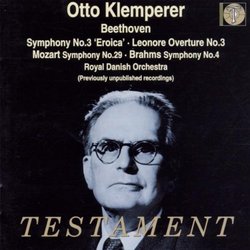| All Artists: Beethoven, Mozart, Brahms, Klemperer Title: Klemperer Conducts Members Wishing: 0 Total Copies: 0 Label: Testament UK Release Date: 6/11/2002 Album Type: Import Genres: Special Interest, Classical Styles: Historical Periods, Classical (c.1770-1830), Modern, 20th, & 21st Century, Symphonies Number of Discs: 2 SwapaCD Credits: 2 UPC: 749677224226 |
Search - Beethoven, Mozart, Brahms :: Klemperer Conducts
CD Details |
CD ReviewsRun, don't walk, to get this CD Andrew R. Weiss | Raleigh, NC USA | 06/29/2002 (5 out of 5 stars) "Otto Klemperer conducted two concerts in Copenhagen, Denmark, with the Royal Danish Orchestra, one in 1954 and another in 1957. The surviving recordings of these two concerts are on this CD, and encompass Beethoven's "Lenore 3" overture and Eroica Symphony, Brahms' 4th Symphony, and Mozart's 29th Symphony. Klemperer recorded all of these works in the studio with the Philharmonia Orchestra in the mid-1950's as well. If you know only Klemperer's studio recordings, you will be floored by what you hear on these discs. We begin with a Leonore overture which will nearly peel paint from the ceiling with its intensity and drama; the sforzandi are like sledgehammers, the dynamic range (beautifully captured by the Danish engineers) is enormous, the interpretation and playing are passionate. This is intense, emotional music making, and the rest of the set lives up to the same standards. The tempi are all faster than Klemperer's studio versions, the orchestral attacks are more precise and incisive, the musical lines are all more dramatic. The Brahms 4th makes Klemperer's studio version sound cool and dispassionate; I find it one of the best and most harrowing interpretations of this great piece I've ever heard, even surpassing Eugene Mravinsky's classic interpretation with the Leningrad Philharmonic. Klemperer and Mravinsky, by the way, are two of the few conductors who truly obey Brahms' "Presto" tempo designation in the final movements' coda. The Mozart is energetic and lyrical. The highlight is the 1957 Eroica, a fierce reading in every respect, especially the outer movements. I find the Eroica to be the Beethoven symphony with which Klemperer had the greatest affinity, and this interpretation souds like life-or-death. Klemperer's lyrical passages carress the music and make it sing; the dramatic passages are earth-shaking. There are of course some slips: there are a couple of moments in both the Eroica and the Brahms 4th where it seems Klemperer and the orchestra fall out of synch with each other and lose focus; the slow movements of both symphonies are quite brisk in tempo and occasionally almost harsh. All in all, however, I don't think you will find more committed music-making anywhere else, by any conducter or orchestra. The Danish engineers did a fine job, especially in 1957, and Testament has done a fantastic job of remastering. The sound is spacious and vivid, and in the 1957 recording the equal of the best studio mono of its era. The Danish orchestra plays sometimes with more conviction than polish, but this is a small quibble as they play fervently for Klemperer. As one of its members said afterwords, the orchestra played its best for him and became more than the sum of its parts. Testament includes an informative essay on the Danish orchestra's history and Klemperer's concerts with them, but no information about the pieces themselves. You won't find a better Klemperer Eroica anywhere; even his other live recording of this piece, the 1960 Vienna concert with the Philharmonia, pales by comparison. Highly recommended, even for music lovers who normally don't like Klemperer (find him too slow, too ponderous, etc. -- they will be pleasantly surprised), and essential for any Klemperer aficionado." What That Other Guy Said! T. Beers | Arlington, Virginia United States | 07/12/2002 (5 out of 5 stars) "The other reviewer has it exactly right. These are awesome (for once, the adjective is completely appropriate) performances, recorded 'live' and in mono, but sounding completely magnificent. If only we had conductors today who performed Beethoven and Brahms with this kind of conviction! I would quibble with the other reviewer only about making comparisons between these performances of Beethoven, Brahms and Mozart and those Klemperer recorded in the studio for EMI. I think it's really hard to say which is/are better, because they reflect such different musical values. Klemperer's studio recordings present a much more careful layering of performance components; the working parameters available in a studio are simply capable of achieving more nuance than can ever be had working "live." But the corruscating immediacy of musical communication delivered in these Testament CDs is its own justification. And, although there are other "live" Klemperer performances of all the material on these CDs, it is amazing how well the Danish Orchestra responds to a guest conductor who didn't conduct all that often in Copenhagen. The Brahms Fourth is much better played than on a (roughly contemporary) Orfeo transcript of Klemperer working with Munich's famed Bavarian Radio Symphony Orchestra. Likewise the "Eroica" .... I've heard "live" Klemperer performances with the Vienna Symphony (Orfeo), the Cologne Radio Symphony (Frequenz) and the Philharmonia (Music and Arts), and none of these compare with the achievement of the Danish Radio Orchestra. Beautiful playing and a wonderfully deep, rich sonority. Not so surprising, I guess, given that this orchestra had been led for years by the great Fritz Busch. Thank you, Testament, for making these performances publicly available. Like the other guy said: Run, don't walk, to get these performances!"
|

